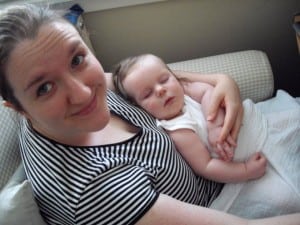Lynsey Hansford describes her own experience as a younger mum and looks at some of the barriers to breasfeeding they face.
You may have heard or observed that younger mums are less likely to breastfeed than older mums. The 2010 UK Infant Feeding Survey found that women aged 30 or above were the group most likely to breastfeed, with women under 20 being the least likely. It comes as no surprise then that a study published last month, from the University of West London’s College of Nursing, found that some young mums feel ‘disempowered’ to breastfeed.
The research, which sought to determine ‘best practice for inpatient breastfeeding support’ for young mothers, found that the initiation of breastfeeding for the participants in the study was compromised by several factors. These included healthcare professionals interrupting skin-to-skin contact after birth, the participants feeling dazed, tired and anxious about breastfeeding and lacking the confidence to ask for help due to feeling like outsiders on the postnatal ward. This led to the mothers having to work out the beginnings of breastfeeding for themselves or not begin breastfeeding at all.
I feel sad about these findings on a very personal level. I completely empathise with these feelings and the thoughts that follow about how the experience could have been different. Whilst these feelings are not exclusive to younger mothers, this study and my own experience suggests they are more commonly found in this age group.
I am a 29 year old mother of 3. I became pregnant with my first child when I was 22 and I first breastfed when I was 23. I am breastfeeding now and have done so for the majority of the past 6 years. I facilitate breastfeeding groups and offer support and information over the phone to pregnant and breastfeeding women in a voluntary role and I am a professional birth and postnatal doula. Working with mothers and babies has become a passion of mine and my own experience mirrors the findings detailed above; breastfeeding mothers tend to be older and from certain sections of society.
So why do younger mothers feel this anxiety around breastfeeding and asking for help? It would appear from the above findings that they may have already seen that health professionals can, and do, intervene in the blossoming mother-baby relationship, as with the interruption to skin-to-skin. They may feel like outsiders because the majority of mothers are older than them (average age for a first time mum in the UK is 29) as indicated in this study; they may feel unconfident because we live in a society that often judges younger parents; they may feel overwhelmed by becoming a parent at a young age and by the responsibilities that come with this.
The reasons for young women choosing not to breastfeed or stopping breastfeeding before they wanted to are so varied and culturally entrenched in the UK that I often wonder in what ways I could reach out to offer breastfeeding support to younger mothers in particular. I am passionate about building a support system where women can be accurately informed and fully supported in their decisions about feeding their baby; I would like all pregnant and postnatal women to have a safe and comfortable space to discuss feeding options.
In my professional and voluntary practice, my first priority is non-judgemental discussion of the situation and an exploration of where the mother is and where she wants to be. I offer support and a listening ear whatever her situation; when women feel able to be honest and open about their feelings and needs it’s easier for me to suggest ideas that might help them.
My opinion is that we don’t give enough credit to our young pregnant women and when we make assumptions about what they will or will not choose to do based on the actions of their peers, we make it even more difficult for them to find the confidence to speak up and ask for the information and support they need.
I think we have to begin with respecting the ability of all women, whatever their age, to make informed choices whilst making every effort to recognise and respect that different groups and individuals have varying needs. I believe each mother can make the best choices for her own children and can be assisted in doing so by being offered enough information and support.
This article was originally published in Visit From The Stork, February 2015

